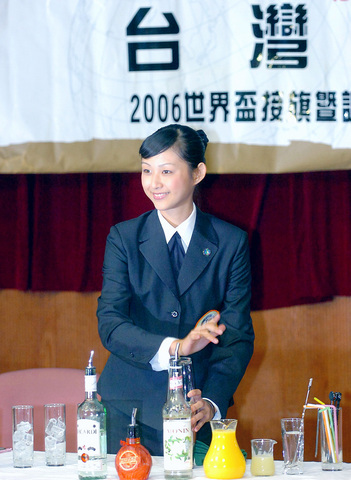At a press conference held in Kaohsiung on Thursday, Kung Hui-chun (
To celebrate her success, the country's hospitality industry has renamed her award-winning cocktail from "Cool Stweetheart" to "Taiwan Sweetheart."
Kung is the first Asian to win the competition, held on Oct. 6, which is organized annually by the International Bartenders Association (IBA).

PHOTO: HUANG CHIH-YUAN, TAIPEI TIMES
This year's competition took place in Thessaloniki, Greece.
The IBA, made up of the bartender associations from 52 countries, has been organizing the annual competition for 32 years in conjunction with the IBA Annual Congress. It also organizes the World Flairtending Competition.
Taiwanese contestants have previously done well in the flairtending competition, and this year, Taiwan's Yu Kang-hsien (
Taiwanese contestants have taken fifth or sixth place in the flairtending competition every year since it was established in 2000. However, no Taiwanese has ever made it to the finals in the cocktail competition before.
This year, the cocktail competion was fought out with "long drink" cocktails -- defined as a long refreshing drink in a 30cl glass. A maximum of five ingredients not exceeding 7cl of alcohol were allowed together with only one edible garnish. A total of 48 participants from as many countries went head to head in a three-round competition, which Kung won ahead of Stefan Stevancsecz from Austria and Tormanen Harri from Finland.
In a news clip broadcast by TVBS on Friday, the audience was seen rooting for Kung while competing with other contestants on the stage. Many non-Taiwanese in the audience were seen shouting "Taiwan! Taiwan!"
The ingredients for Kung's winning cocktail included: 3cl Bacardi Carta Blanca, 3cl Amade Choc-Orange, 3cl Monin Mojito mint syrup, 7.5cl fresh orange juice and 1.5cl fresh lemon juice. The garnish was a slice of lemon, a cocktail cherry or mint leaves.
The combination method used by Kung in the competion final, to paraphrase James Bond, was "shaken, not stirred."

NATIONAL SECURITY THREAT: An official said that Guan Guan’s comments had gone beyond the threshold of free speech, as she advocated for the destruction of the ROC China-born media influencer Guan Guan’s (關關) residency permit has been revoked for repeatedly posting pro-China content that threatens national security, the National Immigration Agency said yesterday. Guan Guan has said many controversial things in her videos posted to Douyin (抖音), including “the red flag will soon be painted all over Taiwan” and “Taiwan is an inseparable part of China,” while expressing hope for expedited “reunification.” The agency received multiple reports alleging that Guan Guan had advocated for armed reunification last year. After investigating, the agency last month issued a notice requiring her to appear and account for her actions. Guan Guan appeared as required,

A strong cold air mass is expected to arrive tonight, bringing a change in weather and a drop in temperature, the Central Weather Administration (CWA) said. The coldest time would be early on Thursday morning, with temperatures in some areas dipping as low as 8°C, it said. Daytime highs yesterday were 22°C to 24°C in northern and eastern Taiwan, and about 25°C to 28°C in the central and southern regions, it said. However, nighttime lows would dip to about 15°C to 16°C in central and northern Taiwan as well as the northeast, and 17°C to 19°C elsewhere, it said. Tropical Storm Nokaen, currently

‘NATO-PLUS’: ‘Our strategic partners in the Indo-Pacific are facing increasing aggression by the Chinese Communist Party,’ US Representative Rob Wittman said The US House of Representatives on Monday released its version of the Consolidated Appropriations Act, which includes US$1.15 billion to support security cooperation with Taiwan. The omnibus act, covering US$1.2 trillion of spending, allocates US$1 billion for the Taiwan Security Cooperation Initiative, as well as US$150 million for the replacement of defense articles and reimbursement of defense services provided to Taiwan. The fund allocations were based on the US National Defense Authorization Act for fiscal 2026 that was passed by the US Congress last month and authorized up to US$1 billion to the US Defense Security Cooperation Agency in support of the

PAPERS, PLEASE: The gang exploited the high value of the passports, selling them at inflated prices to Chinese buyers, who would treat them as ‘invisibility cloaks’ The Yilan District Court has handed four members of a syndicate prison terms ranging from one year and two months to two years and two months for their involvement in a scheme to purchase Taiwanese passports and resell them abroad at a massive markup. A Chinese human smuggling syndicate purchased Taiwanese passports through local criminal networks, exploiting the passports’ visa-free travel privileges to turn a profit of more than 20 times the original price, the court said. Such criminal organizations enable people to impersonate Taiwanese when entering and exiting Taiwan and other countries, undermining social order and the credibility of the nation’s